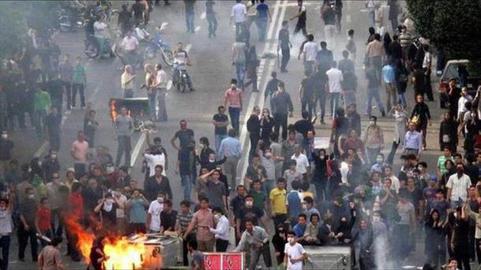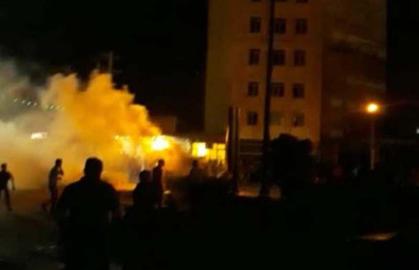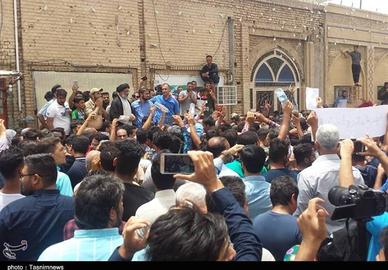“Most of the protesters were young people,” a Khorramshahr resident called Mohammad tells me. “We have the same demands as any other citizen. My friends sent a message: ‘People have gathered around the Motahari crossroads and at Falakeh Allah and have lit fires to protest against the messed-up water situation.’ My mother wanted to stop me but I turned on the faucet and said if we didn’t go to demand what is rightfully ours, nobody else will do it. ‘When my father went to fight and was killed in the same alleyways of this town, did you try to stop him?’”
There are neighborhoods in Khorramshahr still in ruins since the Iran-Iraq war of the 1980s; the rubble remains uncleared. Thirty years on from the war, the deprived people of Khorramshahr still live in these neighborhoods, including Mohammad. “Thirst is not a political issue and has nothing to do with overthrowing the government or rioting,” he tells me. “Water is no joke. Now the governor says the protesters were not from Khorramshahr but saboteurs from other cities. He calls us ‘saboteurs’! Tell the gentleman that I am the son of a martyr. I am not a rioter or a saboteur.”
In his whole life Mohammad, who lives in the Nakhl neighborhood of Khorramshahr, has never had a run-in with the police. “After my father was killed, my mother brought us up by sewing and cooking and packaging the local bread,” he says. “I love my country and I love my city. We only want water. We are helpless in the face of blackouts and lack of water in these hot summer days. We are desperate in the face of dust storms and unemployment. This lack of water has completely exhausted the people of Khorramshahr. The only thing we want is drinkable water.”
Mohammad — who tells me wouldn’t have any problem if I used his real name but says he does not want to take advantage of the name of his martyred father — took part in the protest on June 30 that ended in violence. He witnessed police opening fire and killing a young man. People unbuttoned the man’s shirt to find where he had been hit. Mohammad said he checked for a pulse and the man was still alive. But the situation was chaotic and there were no ambulances able to get him to hospital in time to save him.
According to Mohammad, when the protests started people were only chanting about the water. Nobody was violent, and it appeared that the police intentionally tried to make people angry. “People were chanting calmly and peacefully,” he says, “and their slogans were not political. They said they were thirsty and they wanted water. But the police attacked them savagely. Believe me, people did not set fire to the museum. I was there. It was the police who broke things and attacked. When the sound of shooting started, people were shocked. They became angry. We wanted water not bullets. When they heard the shootings, people set trash cans on fire. It did not happen the way they say. They were destroying things. They made people angry. I saw it with my own eyes.”
Lines for Drinking Water
Every morning Mohammad’s mother stands in line to collect water from a faucet connected to a distribution tanker and then drags home the big 20-liter container with her frail hands.
On June 6, Gholam Reza Pour-Jalali, the head of Khorramshahr’s Water and Sewage Authority, told reporters that the salt levels in the city’s water was almost twice the normal amount [Persian link]. Eighty percent of Khorramshahr’s drinking water comes from the river Karun and 20 percent from the Karkheh River water, which is delivered via the Ghadir water mains. Recently, the level of salt in Karun River has risen as a result of lower precipitation and the advance of Persian Gulf water into rivers. Then the Ghadir water mains broke and the water stopped flowing through the pipe that delivers water to Khorramshahr.
Mohammad says the shortage of drinking water in Khorramshahr is nothing new, describing it as an “old wound.” And the damage to the Ghadir water mains was like the straw that broke the camel’s back, he tells me. “People have written many letters to Mr. Abdollah Sameri, our representative to the parliament,” he says. “Some time ago we filled water containers and went to Abadan’s Friday Mosque where Mr. Gholam Reza Sharafi, the city’s representative to the parliament, was meeting with the people. We told him that this was our drinking water, that calamity is falling from the sky [dust storms] and that unemployment and the heat show no mercy. At least they could do something about the drinking water.”
The news website Tabnak reported on a project to transport drinking water from Ghaysarieh pumping station in Hoveyzeh in southwest Iran for use by two million residents of the Iraqi port city of Basra [Persian link]. Iranian officials deny rumors that water is being exported from Iran.
On Saturday, June 30, Sharafi also denied rumors that the water was being exported to Kuwait or Iraq and said he had repeatedly warned the authorities responsible for water and electricity about the situation in the region. “For a year and a half I have been warning the responsible officials, big and small, about the current situation in Abadan and Khorramshahr — in writing, verbally, in person and by phone. I am no oracle or magician. By studying the official reports about the shortage of water, the decline in precipitation, the wasteful use of water, etc., we predicted that it would happen and it did. We even warned if precipitation was 15 or 20 percent less than in previous years then it would cause a disaster. But nobody listened.”
According to Tabnak, the news about exporting water emerged from Iraq’s al-Beladi TV network. It says the Iraqi media reported that Iranian officials had agreed to transfer water from the river Karun to the province of Basra. Iranian Labor News Agency, however, quoted Gholam Reza Sharafi as asking: “What kind of conscientious statesman would agree to such a thing?”
Don’t Pay the Water Bills
Mina N., an environmental activist and an expert in water resources, told IranWire that even if reports of exporting Karun’s water to Basra are false, the transfer of water from this river to other Iranian provinces has paralyzed Khuzestan. She says that instead of street demonstrations and clashes, the people need a campaign of refusing to pay the bills issued by the Water and Sewage Corporation.
She believes the water crisis is the result of pumping water from the source of the Karun River to the central province of Isfahan through the Kuhrang Tunnel Project. “People and environmental activists must force the government to pay attention to the water shortage in Khuzestan,” Mina said. “The government must stop redirecting Khuzestan’s power through the Behesht Abad, Sabz Kuh and Birgan projects. People should not pay their water bills for this month. This kind of protest, I believe, will be more effective.”
The cleric Hojatoleslam Mehdi Sadr al-Sadati has been active in various campaigns against redirecting Karun’s water, and he agrees with Mina. “The Water and Sewage Corporation has a contract to get paid by the people for supplying safe and clean water, not for saltwater or water that tastes like sewage,” he wrote on his Instagram page. “I myself witnessed that they had billed 70,000 tomans [about $17] for 40 days of delivering polluted water to the Shalang Abad neighborhood in Ahvaz. This is a travesty and the money is haram [forbidden under sharia law]. I have no doubt that that Khuzestan’s Water and Sewage Corporation is receiving haram funds.”
More on water shortage and unrest in Khuzestan:
Forced to Migrate for a Glass of Drinking Water, June 29, 2018
Police Open Fire on Thirsty Crowds, July 1, 2018
More on drought and environmental crisis in Iran:
An Iranian Patriot Vs. a Corrupt System, April 19, 2018
Drought in Sistan and Baluchistan, December 14, 2017
New Health Warnings for Lake Urmia, July 20, 2015
Disaster is Looming, June 15, 2015
New Fears For Public Health near Lake Urmia, May 28, 2015
“Iran Could end up like the Horn of Africa”, January 30, 2015
Crime: Defending the Environment, November 4, 2014
Iran's Provincial Water Wars, November 7, 2013
visit the accountability section
In this section of Iran Wire, you can contact the officials and launch your campaign for various problems


























comments